| Introduction |
|
At the beginning of June, a group of about 40 partners from diverse backgrounds met in Entebbe, Uganda to shape the proposal for N2Africa Phase II. We had strong participation from national research organisations, the private sector, local and international NGOs and other international partners. All N2Africa countries were represented. Dr Peter Ebanyat, N2Africa Coordinator Uganda and Makerere University hosted the workshop together with the local IITA office. ...
Photo: Hill sides covered with common beans in northern Tanzania
|
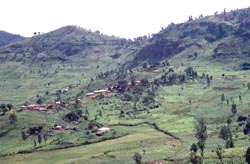 |
|
1 |
| N2Africa Ethiopia kick-off |
|
Pulses are important food and cash crops for farmers and rural households in Ethiopia. Pulses are the second most important element in the national diet, providing the principal protein source and important dietary supplement to cereal consumption. Pulses recently have regained significance as export commodities. Despite the economic and food security importance of these crops, actual smallholder farm yields are far below the potential production, e.g. 1.3 t/ha for common bean and 1.5 t/ha for chickpea and faba bean. Targeting technologies for legume production in farming systems, N2Africa is an important project for Ethiopia. ...
|
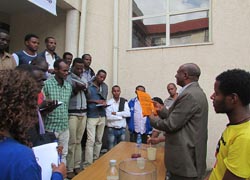
Photo: Workshop participants actively attending demonstrations on inoculation of seeds
|
|
2 |
| Use of inoculants to improve soyabean yield and Biological Nitrogen Fixation in Malawi |
Soyabean is an important crop in the farming systems in Malawi, particularly as a source of cash and proteins. In addition, soyabean has the potential to replenish soil nitrogen (N) through biological nitrogen fixation (BNF). The N fixed by soyabean can also be utilized by the component crop when used as an intercrop or in crop rotation. However, the potential benefits of soyabean in smallholder farming system are often not realised because of poor agricultural practices. ...
|
2 |
| Going beyond PREA (Participatory Research and Extension Approach) |
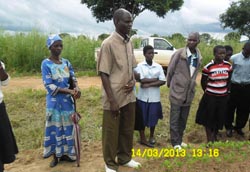 |
After two seasons of implementing N2Africa activities in Malawi, the team changed the dissemination approach for sustainability purposes. Previously, the team already worked with the PREA (Participatory Research and Extension Approach) in which N2Africa staff trained Lead/Master Farmers who in turn trained satellite farmers in legume technologies. Now, the team has modified the PREA, empowering Lead Farmers to train School teachers and students in legume technologies. ...
Photo: The Head teacher, Anthony Jere, standing next to the Lead Farmer, Agnes Nyoka (in blue clothes)
|
|
2 |
| N2Africa Writeshop, Wageningen, 21-24 May 2013 |
N2Africa conducted a writeshop in Wageningen, the Netherlands from the 21st to the 24th of May 2013. The objective of the writeshop was to providing participants the opportunity to develop papers in small teams, review each other’s draft manuscripts and share ideas – all aimed at improving the quantity and quality of papers produced by the participants in the N2Africa project. ...
|
2 |
| On-farm evaluation of the response of chickpea to inoculation and P fertilization in southern Ethiopia |
|
Ethiopia is the leading chickpea producer in Africa with a share of 39% of the total production in 2011. To investigate how chickpea productivity can be increased, a study was conducted to evaluate the response of chickpea to inoculants, P fertilizer and their combined application on farmers’ fields in Wolaita area in southern Ethiopia. ...
Photo: Ibsa in one of the experimental fields
|
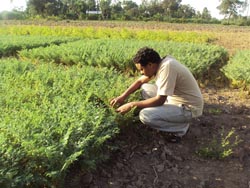 |
|
3 |
| Hawassa University in Ethiopia identified effective strains for pulses |
|
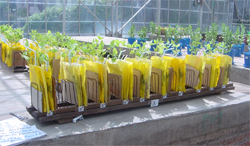
Picture 3/4. Authentication of rhizobial isolates on homologous host (Phaseolus vulgaris)
|
Hawassa University (HwU) has been conducting research on rhizobium-legume symbiosis for more than a decade in collaboration with researchers in universities in the Northern Hemisphere (Norway, Finland, Germany, Canada). Along this path, we have genetically and symbiotically characterized hundreds of rhizobial strains isolated from soils in Ethiopia, identified several new genospecies and named the unique ones (International Journal of Systematic and Evolutionary Microbiology (2013) 63, 1746-1753, and google "rhizobia and southern and Ethiopia" for more information).
....
|
|
3 |
| CRS convene stakeholders in soyabean sub-sector to discuss soyabean variety and seed issues in Tanzania |
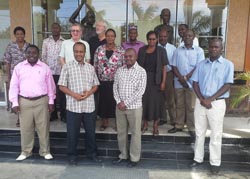 |
The Catholic Relief Services (CRS), through the United States Department of Agriculture (USDA) -funded Soya ni Pesa Project is supporting small holder farmers in Southern highlands (Ruvuma and Njombe regions) of Tanzania to grow soyabean. ...
Photo: Participants of CRS-consultative meeting held in Dar es Salaam to deliberate on ways to improve the availability of soyabean seeds in Tanzania
|
|
4 |
| Characterization reports Tanzania and Ethiopia available |
As background documents for the new countries Ethiopia, Tanzania and Uganda characterization reports have been written with information on agronomy, farming systems and ongoing projects on grain legumes in the different countries. ...
|
4 |
| New Autoclave installed at Legume Inoculant Factory in Marondera, Zimbabwe |
|
As part of the investment in rhizobiology research and inoculant production in the different N2Africa countries, N2Africa recently facilitated the replacement of a 33 year old autoclave at the government inoculant factory in Marondera, Zimbabwe. ...
Photo: Front side: Zvomuya Munyaradzi, manager production facility
|
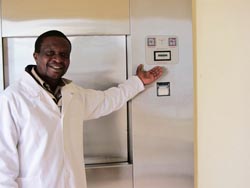 |
|
5 |
| New International Course on Agriculture Nutrition Linkages |
The Centre for Development Innovation Wageningen UR is pleased to announce the organisation of the International Course on Agriculture Nutrition Linkages, to be held in Addis Ababa, Ethiopia from 18 - 29 November 2013. ...
|
16 |
| Inoculating legumes: a practical guide. Grains Research & Development Corporation (GRDC) |
We received a link to a very interesting publication written by the Australian team Drew E, Herridge D, Ballard R, O’Hara G, Deaker R, Denton M, et al.: INOCULATING LEGUMES: A PRACTICAL GUIDE. Grains Research & Development Corporation (GRDC) [Internet]. Kingston, Australia; 2012. ...
|
17 |
| 6th International Nitrogen Conference (N2013): ”Just Enough N: Perspectives on how to get there for “too much” and "too little" Regions” |
For the 6th International Nitrogen Conference (N2013), hosted by both Makerere University and IITA from 28th Nov to Dec 2013, in Kampala, Uganda (link http://www.n2013.org/) N2Africa will sponsor a number of selected participants that will present a paper or poster on N2Africa work. ...
|
17 |
| Farming systems course announcement |
The International Postgraduate Course "Farming Systems and Rural Livelihoods: Vulnerability and Adaptation"will be held 7 – 18 October 2013 in Wondo Genet, Ethiopia. ...
|
18 |








